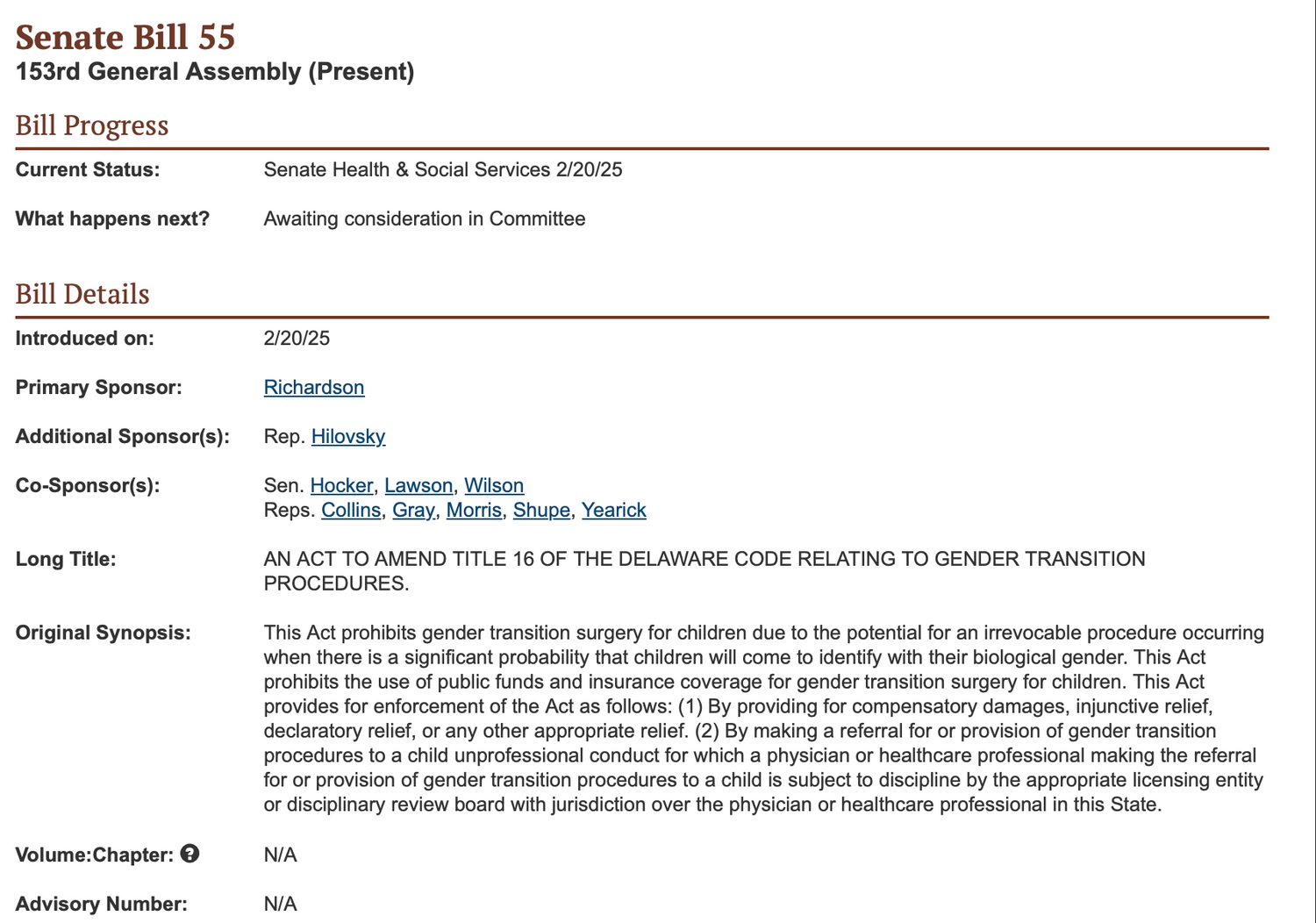Introduction:
Gender identity has been a part of human experience throughout history. However, for transgender and gender-diverse individuals, the journey towards self-acceptance often involves overcoming societal misunderstanding and discrimination. Recent legislative measures, such as Delaware's Senate Bill 55, aim to restrict access to gender-affirming care for minors. From a psychological standpoint, these policies raise significant ethical concerns and pose a serious threat to the well-being of transgender youth.
Historical Context of Gender Diversity:
Gender diversity isn't a new phenomenon. Many cultures have long recognized and respected non-binary and transgender identities. For instance, numerous Indigenous cultures in North America acknowledge Two-Spirit individuals. Similarly, South Asian cultures have historically recognized hijras. Despite this rich history, Western societies have often marginalized transgender individuals, leading to systemic discrimination and mental health disparities.
The Psychological Impact of Denying Gender-Affirming Care:
Research consistently shows that transgender and gender-diverse youth face higher rates of psychological distress compared to their cisgender peers. This distress stems from societal stigma, discrimination, and lack of access to supportive resources. Gender dysphoria can lead to significant mental health challenges, including depression, anxiety, and suicidal thoughts.
Access to gender-affirming care, which can include counseling, hormone therapy, and sometimes surgery, has been shown to alleviate these symptoms. Studies, such as those published in JAMA Network Open, have found significant reductions in depression and suicidality among transgender and nonbinary youth who receive this care. Conversely, denying such care can worsen mental health issues, increasing the risk of self-harm and suicide attempts.
The Role of Misinformation and Social Media's Impact
In today's digital age, social media plays a significant role in shaping public opinion and discourse. Unfortunately, it also serves as a platform for the rapid spread of misinformation. This is particularly harmful to transgender and gender-diverse youth, who are often targeted by negative campaigns and false narratives.
- The Spread of Misinformation: Social media algorithms can inadvertently amplify sensational and often untrue stories about transgender individuals and gender-affirming care. This misinformation can create a distorted view of reality, leading to fear, prejudice, and discriminatory attitudes. Common false claims include:
- Impact on Mental Health: Transgender and gender-diverse youth often turn to social media for community and support. While it can be a valuable resource for finding others with similar experiences, it can also expose them to cyberbullying, hate speech, and misinformation. This can exacerbate mental health challenges, such as anxiety, depression, and feelings of isolation. The constant negativity and scrutiny can be incredibly damaging to their self-esteem and sense of belonging.
- Echo Chambers and Polarization: Social media algorithms often create "echo chambers," where individuals are primarily exposed to information that confirms their existing beliefs. This can further polarize opinions on transgender issues, making it harder to have constructive conversations and find common ground. Misinformation within these echo chambers can be reinforced, solidifying false narratives and making it less likely for people to accept accurate information.
- Strategies for Countering Misinformation: It is crucial to actively counter misinformation and promote accurate information about transgender issues. Here are some strategies:
- Promoting Online Safety: It is essential to educate transgender and gender-diverse youth about online safety practices. This includes:
By understanding the role of misinformation and social media's impact, we can work to create a safer and more supportive online environment for transgender and gender-diverse youth.
Delaware's Senate Bill 55: A Closer Look
In February 2025, Delaware introduced Senate Bill 55, which aims to prohibit the use of public funds and insurance coverage for gender transition surgeries for minors. Proponents argue this protects children from making irreversible decisions. However, this view overlooks several critical issues:
- Implications for Providers of Mental Health: Senate Bill 55 could discourage healthcare providers from making referrals for gender-affirming care due to fear of legal or financial consequences. This could lead to treatment delays, harming the mental and physical health of transgender youth.
- Medical Guidelines and Practices: Major medical organizations like the AMA, APA, and WPATH support gender-affirming care for youth. These guidelines emphasize thorough assessments by qualified professionals. Misconceptions, like all gender-affirming care involving surgery or that children are too young to know their gender, are inaccurate. Research supports the positive outcomes of gender-affirming care. Laws that aim to restrict specific medical procedures or treatments for one group may have unintended consequences for other groups, including intersex individuals. For example, if a bill restricts access to hormone therapy, it could affect intersex individuals who rely on such therapy for their health and well-being.
- Ethical Concerns: Restricting access to necessary care violates the principle of autonomy, preventing youth from making informed healthcare decisions with their providers and guardians. It also contravenes beneficence, as denying care can cause significant harm. Furthermore, it's discriminatory, targeting a vulnerable minority group.
- Mental Health Ramifications: The Trevor Project's 2022 report shows that 63% of transgender youth in restrictive environments report depression symptoms, and 76% experience anxiety. This highlights the damaging impact of denying affirming care.
What to Do: Call to Action
Here's how WE can make a difference:
- Educate Yourself and Others: Learn about transgender issues and share accurate information.
- Contact Your Legislators: Voice your concerns about restrictive legislation.
- Support LGBTQ+ Organizations: Donate to or volunteer with groups like The Trevor Project and HRC.
- Create Safe and Affirming Spaces: Use correct names and pronouns, and challenge transphobia.
- Support Transgender Youth Directly: Offer support and acceptance, and seek resources if you are a parent or family member.
- Vote for Pro-Equality Candidates: Support those who protect LGBTQ+ rights.
Conclusion:
The history of transgender individuals is one of resilience. As our understanding evolves, policies must reflect compassion and evidence-based practices. Delaware's Senate Bill 55 poses significant psychological and ethical concerns. Supporting transgender youth through accessible, affirming care is crucial for their well-being and their right to self-determination.
Local Resources
I. Organizations and Support Services:
- The Trevor Project:
- Human Rights Campaign (HRC):
- PFLAG:
- United Way of Delaware Pride Council:
- GLAAD:
- CAMP Rehoboth:
- Delaware Pride:
- The Emerald Lighthouse:
- Equality Delaware:
II. Specific Resource Areas:
- Mental Health:
- Healthcare:
- Community and Social Support:
- Legal and Policy Advocacy:
Research
- American Psychological Association. (2021). APA Resolution on Gender Identity Change Efforts.
- JAMA Network Open. (2022). Mental health outcomes in transgender and nonbinary youth receiving gender-affirming care.
- The Trevor Project. (2022). National Survey on LGBTQ Youth Mental Health.
- Associated Press. (2025). What medical care for transgender minors is at stake in Supreme Court case?
- The Guardian. (2024). If Trump wins the election, he could launch a ‘catastrophic’ rollback of LGBTQ+ rights.
- Legislative Hall, Delaware General Assembly. (2025). Senate Bill 55.




